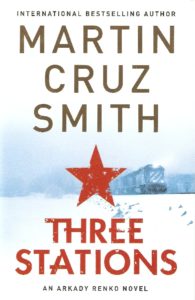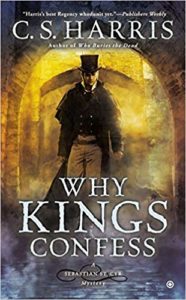I’ve enjoyed a number of Dan Jones’s popular histories like The Plantagenets and Magna Carta and have read a great deal about The Hundred Years’ War, so I was looking forward to his debut historical novel Essex Dogs. It features a ragtag small company of soldiers and bowmen headed for Normandy in 1346 and ultimately the Battle of Crécy where the French lost to the English in a humiliating, historic defeat. That battle changed the balance of power in Europe with France’s heavily-armored mounted knights beaten by the more mobile English troops and their archers.
It’s potentially superb material but the book feels cartoonish, partly because the dialogue is wildly anachronistic, stuffed with every version of the f-bomb you can imagine. Historians agree that the word was not in popular use in the 14th century, but Jones’s characters sometimes sound like they’re in Goodfellas. “Fuck you looking at?” is one example, and for emphasis, that knight says it twice. The French are, of course, called “fuckers” and “fucking” is the invariable English adjective of choice, with “Fuck off!” a frequent command. How did a responsible editor let this dialogue pass muster?
At one point some variation of “fuck” crops up four times in only six very short paragraphs, and that’s not the only place where that word choice becomes an oppressive drumbeat. Sometimes, though, the profanity becomes simply ridiculous, as when an earl shouts “The faster you fucking go, the sooner you’re fucking back!”
But profanity overkill isn’t the only problem with the prose. There’s the leader of the small band, Loveday Talbot, remembering his “mantra,” knowing who “has his back” and there are people discussing how they should “play” a situation as they hit the beach in Normandy. This discordant dialogue had me on the alert for someone saying “Let’s do this thing.” It didn’t happen, but there was this priceless piece of defiance going into battle: “Let’s show them who we are.”
It’s a shame that the writing isn’t better because Jones does a decent job of making you feel the heat and filth of the expedition of 15,000 men, along with the chaos of their landing and the brutality of combat. But sometimes it feels as if he’s reveling in the gore and grime. That gets tedious, and there’s way more phlegm, spit, shit, and snot than the book needed.
One other aspect weighs the novel down: there’s a grotesque, drunken, slovenly, drug-addled, farting priest whose presence in the company is totally unnecessary. He adds nothing to the story and it’s a relief when he’s dead, though that takes over 250 pages to happen. It’s hard to care for him or any of the other characters in this book since they’re all one-dimensional and that even applies to Loveday himself.
Though Jews were expelled from England in 1290, Jones has a Jew as a former member of the company some fifty years later–and gives him an improbable name: Wiseman the Jew. Plenty of sources show that Biblical names like Jacob, Moses, Samuel, Isaac, Joseph and Abraham would have been much more authentic for an English Jew if he had somehow managed to be living in England at that time and serving in the army of Edward III. Even the Latin Benedict (for Baruch) would have made more sense since Jews sometimes used Latin names derived from the Hebrew. More puzzling than that, Edward III’s son, later the famous Black Prince, is portrayed as a whining, drug-addled, annoying teenage brat and there’s nothing remotely epic about the climactic Battle of Crécy that everything has been leading to.
The book is a very long slog compared to the richly-imagined and beautifully-written historical novels of Bernard Cornwell set during the Hundred Years’ War. Read any one of them, like The Archer’s Tale, for a truly immersive experience. Cornwell doesn’t kick you out of his fiction with glaring anachronisms or gratuitous profanity, and his deep characterization, his sense of texture, and his grasp of human and period psychology are far superior to anything you’ll find in Essex Dogs. Jones says in his acknowledgments that he was encouraged to write fiction and I wish he’d gotten better advice on how to work in a new genre. ★★
Lev Raphael has reviewed books for The Detroit Free Press, the Washington Post, Jerusalem Report, Bibliobuffet, The Ft. Worth-Star Telegram and various public radio stations.



